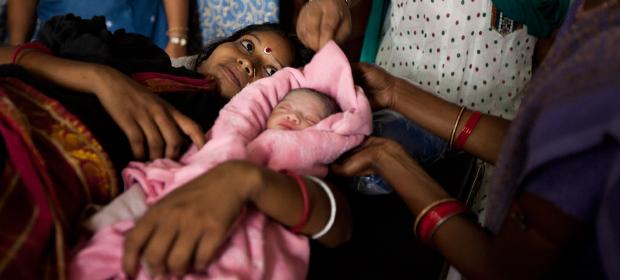Where We Work
See our interactive map


| Date(s): | - |
| Location: |
Kuala Lumpur,
Malasia
|
Women Deliver’s third global conference focused on the health and well-being of girls and women will take place May 28-30 in Kuala Lumpur, Malaysia. IntraHealth will join more than 5,000 participants at Women Deliver 2013 to support keeping the health and rights of girls and women at the top of the global development community’s priority list.
Special Event | Presentations | Featured Resources | Related Blogs
Empowering Frontline Health Workers to Help Women Deliver in India
Wednesday, May 29, 7:30-9:30 pm | Room 405
IntraHealth will host a side event to share IntraHealth and the Government of India’s efforts to scale up proven interventions, which have increased the number and quality of births with a skilled attendant, maternal and newborn home visits, and better health practices. We will also share experiences in the use of an innovative mobile phone job aid by frontline workers in India.
Integration of Contraception and Other Health and Non-health Components | Maureen Corbett, Vice President of Programs
Task Sharing and Task Shifting: Investing in Frontline Health Workers Pays in Lives Saved | Laura Hoemeke, Director of Strategic Communications and Knowledge Management
Strengthening the Health Worker Pipeline through Gender-Transformative Strategies | Constance Newman, Senior Team Leader, Gender Equality and Health [see related resource]
Video: Improving Skilled Birth Attendance in Jharkand
Learn more about how IntraHealth’s Vistaar Project worked with the Government of India to increase the number of auxiliary nurse midwives trained and certified as skilled birth attendants and to increase the number and quality of deliveries and related services in Jharkhand, India.
Transforming the Health Worker Pipeline: Interventions to Eliminate Gender Discrimination in Preservice Education
Newman C, Ng C, and Pacqué-Margolis S. CapacityPlus. 2012.
This technical brief provides an overview of how gender discrimination affects health professional students and faculty as well as intervention options that have the potential to counter gender discrimination. It also offers recommendations for preservice education institutions and other stakeholders to address these challenges.
Are Health Workers Delivering for Women? And Are We Delivering for Health Workers?
In 2010, an estimated 287,000 women died from complications related to pregnancy and childbirth. Of these deaths, 85% occurred in sub-Saharan Africa and Southern Asia. This represents a global decline of 47% since 1990—but falls disappointingly short of the Millennium Development Goals (MDG) target of 75%. Last week, I returned from Women Deliver, the . . . . » Read more
Nurses Can Close the MDG Gaps in Maternal and Reproductive Health, but Not without New Skills and Mentorship
I recently had the opportunity to travel and work with our team in Uganda to help the Ministry of Health (MOH) plan for, develop, and manage its health workforce. I was reminded again of the strenuous demands placed upon nurses. Many of the nurses I met were by default “doing it all,” offering an array of facility-based and community services they weren’t fully trained . . . » Read more
ICTs in Maternal and Child Health Poised for Scale-Up in Uttar Pradesh, India
Frontline health workers with mobile phones capturing complex data on pregnant women and children, women receiving SMS text reminders before their ‘due’ dates, mobile phone based training courses for health workers: the health sector in India is rapidly harnessing the power of technologies to streamline and enhance the quality of its maternal and child health services. » Read more
Gender Equality: The New Business as Usual
The past four years have brought some exciting changes in the US government when it comes to progress in gender equality. In January, President Obama issued a memorandum reminding us that “promoting gender equality and advancing the status of women and girls around the world remains one of the greatest unmet challenges of our time, and one that is vital to achieving our overall foreign policy objectives.” » Read more
Vistaar: Two Decades of Collaboration for Women and Children
This year, 2012, marks 20 years of engagement and partnership between IntraHealth International and the Government of India. Much has changed over these last two decades.India’s economy has grown as its per capita gross domestic product (GDP) more than quadrupled from $322 per year in 1992 to $1,489 in 2011. (US per capita GDP has not even doubled over the past 20 years).1 In that same time period, India’s population rose by 330 million people to an estimated 1.24 billion in 2011. » Read more
Star of Senegal: A Midwife Fights for Affordable Family Planning
Aïssatou Dia Fall has become a star in Yeumbeul, Senegal. She is neither a popular singer nor a famed dancer, but she excels at empowering women in the poorest suburbs of Dakar. With her help, poor urban women are able to fully enjoy their lives and families. “I cannot allow these women to lose control over their lives because they have to choose between feeding their families and planning them,” Fall says. » Read more



